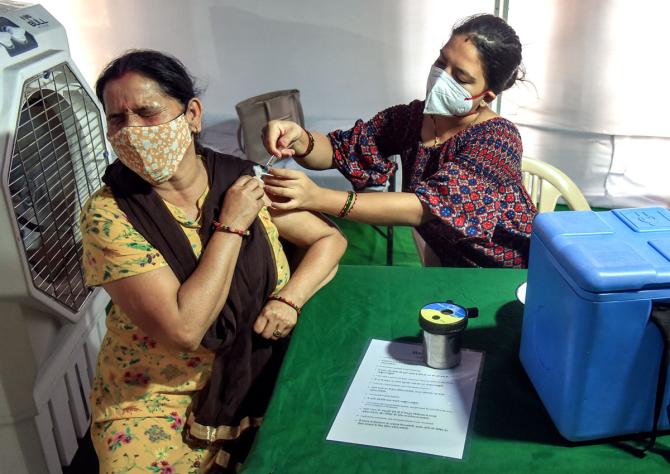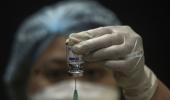So far, no other vaccine has been approved globally for children below 12 years.
Sohini Das reports.

Ahmedabad-based pharma major Cadila Healthcare (Zydus Cadila) is planning to start clinical trials on children aged 5 years and above soon for its DNA-plasmid technology-based Covid-19 vaccine, claimed a senior official.
Meanwhile, the company is awaiting approval from the Drugs Controller General of India for its vaccine ZyCoV-D.
It has sought approval for use in children above 12 years, and has already submitted safety and tolerability data from the phase 2 clinical trials and has generated data on 1,000 adolescents (between 12 to 18 years) from its phase 3 trials too.
The 1,000-volunteer data will be submitted with the regulator soon.
"We now plan to start trials on children aged five years and above if the regulator approves," said Sharvil Patel, managing director of Zydus Cadila.
So far, no other vaccine has been approved globally for children below 12 years.
India's Bharat Biotech is now in the middle of conducting clinical trials on children above 2 years for Covaxin.
If things go well, ZyCoV-D could be the first approved vaccine for adolescents.
Zydus has also claimed that its vaccine works against the Delta variant; as the trials carried out in more than 50 clinical sites spread across the country and during the peak of the second wave of COVID-19 has shown the vaccine’s efficacy against the new mutant strains, especially the delta variant.
At the moment, the DCGI and its expert committee are reviewing the data submitted by Zydus from a 28,000 people phase 3 efficacy trial.
According to sources, the Subject Expert Committee (SEC) is likely to take up the review of ZyCoV-D this week. So far the regulator and experts have been studying the data submitted.
ZyCoV-D has shown a 66.6 percent efficacy in interim analysis of phase 3 trials, and can be stored at 25 degree Celsius for three months.
It is a three-dose vaccine given on day zero, day 28 and day 56.
No moderate case of COVID-19 disease was observed in the vaccine arm post administration of the third dose suggesting 100 percent efficacy for moderate disease.
No severe cases or deaths due to COVID-19 occurred in the vaccine arm after administration of the second dose of the vaccine, the company claimed.
Meanwhile, Zydus has also submitted immunogenicity data from a two-dose regimen (using 3 mg doses) trial to the DCGI, which shows 'equivalent immunogenicity' with that of the three dose regimen.
Patel is thus hopeful that there would be a 'good discussion point' with the regulator for approval for a two-dose regimen.
Conventional active vaccines are made of a killed or weakened form of the infectious agent.
DNA plasmid vaccine is a relatively new approach where a piece of DNA containing the genes for the antigens is injected.
The body then learns to develop an immune response against the antigen, and when the actual pathogen attacks, the body is able to generate the specific antibodies against it.
DNA vaccines, Zydus has claimed, have been shown to stimulate sustained immune responses.
ZyCoV-D efficacy is in the range of Johnson & Johnson's single dose vaccine which uses a human adenovirus vector Ad26 – 66.3 percent efficacy in preventing Covid19 illness.
As for Oxford-AstraZeneca vaccine, the World Health Organisation notes on its website, "The AZD1222 vaccine against COVID-19 has an efficacy of 63.09 percent against symptomatic SARS-CoV-2 infection."
Bharat Biotech's Covaxin has shown 77.6 percent efficacy against symptomatic Covid illness from interim analysis of phase 3 trials, while Russia’s Sputnik V has shown 97.8 percent efficacy against severe Covid disease in an 81000 subject trial in UAE recently.











